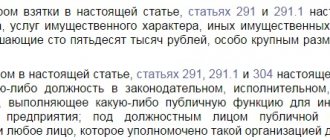The Criminal Code of the Russian Federation interprets the concept of “smuggling” as the transportation of goods and valuables across state borders in violation of the rules provided for by law.
In accordance with the ruling of the Supreme Court of the Russian Federation, contraband can be any movable items, most often among which are money, manuscripts, objects of art, drugs, psychotropic drugs. Article 189 of the Criminal Code of the Russian Federation provides that raw materials, materials, various equipment, scientific and technical data, services and work for foreign companies can also be illegally exported. In this case, only movable property is considered contraband.
Smuggling is a criminal offense. Responsibility for it may be borne by a sane person over 16 years of age who committed a criminal act with direct intent. Most often, this crime is committed for the purpose of obtaining selfish gain.
Punishment under Article 189 of the Criminal Code of the Russian Federation
For the illegal export of goods considered to be contraband, the offender may be subject to the following sanctions:
- monetary penalty in favor of the state in the amount of 100-500 thousand rubles;
- prohibition from holding a certain position or carrying out specific activities for 5 years;
- performing forced labor for 3 years;
- 3 years imprisonment.
As with any other crime, the law provides for aggravating circumstances. According to Article 189 of the Criminal Code of the Russian Federation, for smuggling carried out by prior conspiracy or by an organized group of persons, the accused face a sentence of 5 or 7 years in prison, respectively.
On judicial practice in smuggling cases
Taking into account the provisions of paragraph 2 of Article 101 of the Treaty, the terms used in Articles 200.1, 200.2, 226.1 and 229.1 of the Criminal Code of the Russian Federation “customs border of the Customs Union within the framework of the EurAsEC” (“customs border of the Customs Union”), “State border of the Russian Federation with member states of the Customs Union” union within the EurAsEC" should be understood accordingly as "the customs border of the Eurasian Economic Union" (hereinafter - the customs border), "The state border of the Russian Federation with the member states of the Eurasian Economic Union" (hereinafter - the state border).
2. Courts should take into account that the procedure for moving goods and other items across the customs border or state border, as well as prohibitions and (or) restrictions associated with such movement, along with the legislation of the Russian Federation (on customs, on the State Border of the Russian Federation, on currency regulation and exchange control, on export control and others) are established by the law of the Union (Articles 6 and 32 of the Treaty).
Union law also includes decisions and orders of the permanent regulatory body of the Union - the Eurasian Economic Commission, adopted within the framework of its powers (for example, decision of the Board of the Eurasian Economic Commission dated April 21, 2015 No. 30 “On non-tariff regulation measures”).
When considering cases of smuggling of cultural property, courts should take into account that the list of cultural property for which a permitting procedure for export from the customs territory of the Union has been established, the rules for their export from the Russian Federation to other states that are not member states of the Union are determined by decisions of the Board of the Eurasian Economic commissions.
3. When deciding whether a person’s actions contain signs of crimes provided for in Articles 200.1, 200.2, 226.1 and 229.1 of the Criminal Code of the Russian Federation, courts must establish that illegally transported goods or other items belong to the contraband items listed in these articles.
If special knowledge is required when establishing that illegally transported goods or other items are contraband, then the courts must have the appropriate opinions of experts or specialists.
4. When determining the value of contraband items illegally transported across the customs border or state border, courts should proceed from state regulated prices, if any; in other cases, the amount of the indicated value is determined on the basis of the market value of goods, with the exception of goods moved by an individual across the customs border for personal use, in respect of which the customs value determined in accordance with Chapter 49 of the Customs Code of the Customs Union is used. In this case, it is necessary to take into account legal norms that allow not to take into account that part of the value of illegally moved goods that is allowed to be moved without declaration and (or) was declared (for example, note 3 to article 2001, note 2 to article 2002 of the Criminal Code of the Russian Federation).
Transportation of drugs and features of determining punishment
Particularly stringent measures are provided for today by legislation in relation to persons involved in the illegal import/export of drugs and various psychotropic drugs, including their precursors containing narcotic components of plants, and tools used for the manufacture of drugs. However, the penalties provided for drug smuggling under Article 229.1 differ significantly:
- if we are talking about a person who has separately committed a crime, then he may be sentenced to a preventive measure in the form of imprisonment for a period of one to seven years, along with a fine of up to 1 million rubles. or income for a period of up to five years;
- for a conspiring group, an official, or in case of illegal movement of this group of goods in a significant quantity, the term of imprisonment can be from 5 to 10 years along with a fine;
- if in the cases described above the size of smuggling is determined to be “large”, then imprisonment is provided for up to 12 years;
- in situations where we are talking about an organized group, smuggling on a particularly large scale, with the use of violence against the person exercising customs control, the punishment can be not only imprisonment for fifteen to twenty years and a fine, but also up to lifelong imprisonment .
Read also: Beautiful girl smokes a hookah
As we see, there are also many nuances in this situation, and the most important thing is to correctly understand what can be called a “significant” size, “large” or “especially large”, and this comes from other articles of the Criminal Code. The correct interpretation will determine the amount of sanctions imposed, so only an experienced and competent lawyer will be able to understand all the details, preventing a more severe punishment from being applied to the violator of the law than he actually deserved.
Liability due to ignorance
According to Agranovsky, it is possible to fall under criminal liability due to ignorance - we are talking about illegal acquisition.
“If you come somewhere where sturgeon live, for example in Astrakhan, and you are offered to buy red caviar from your hands, then you will easily fall under this article. If you come to Yuzhno-Sakhalinsk and are offered to try sea cucumbers out of season, that too. They are even rarer than black caviar,” the specialist said.
You cannot purchase such things by hand at all - only through special licensed stores. <…> It may be more expensive, but it’s legal
Dmitry Agranovsky
lawyer.
In case of doubt, Agranovsky advised to look at the documents for the products, pay attention to the price of the same caviar, and ask about the experience of local residents.
“If the buyer did not have any reason to believe that the store sells caviar illegally - there are receipts and so on - he may well be able to prove that there was no crime in the actions. If you buy secondhand or in dubious conditions - under the counter or without receipts - then anyone can realize that they are buying illegally,” the lawyer explained.
He recalled that “special conditions apply” for black caviar. A person may act in good faith, but then find himself embroiled in litigation. Responsibility threatens specifically for the illegal purchase of products.
“If [buyers] make mistakes in good faith, […] they may become victims of fraud. Illegal trade, selling under the guise of legal, in my opinion, constitutes fraud on the part of the seller. It’s like selling a stolen car with broken license plates,” Agranovsky expressed his point of view.
Clause “a”, Part 2, Art. 226.1 of the Criminal Code of the Russian Federation
Clause “a”, Part 2, Art. 226.1 of the Criminal Code of the Russian Federation provides for criminal liability for the act provided for in Part 1 of Art. 226.1 of the Criminal Code of the Russian Federation, committed by an official using his official position.
Persons using their official position include officials (see note to Article 285 of the Criminal Code of the Russian Federation), employees, as well as persons exercising managerial functions in commercial and other organizations (see note to Article 201 of the Criminal Code of the Russian Federation).
Under the official in paragraph “a” of Part 2 of Art. 226.1 of the Criminal Code of the Russian Federation should be understood as officials of the customs authorities of the Russian Federation (in particular, officials who have the right to be in customs and border control zones and exercise control over the movement of goods), as well as other persons who, by virtue of their official powers, could contribute to the illegal movement of goods (for example, border control officials of the border agencies of the FSB of Russia).
Smuggling committed by an official using his official position does not require additional qualifications under Art. 285 of the Criminal Code of the Russian Federation.
Commentary to Art. 226.1 of the Criminal Code
1. The subject of the crime is the items, substances, materials and equipment specified in the article, especially valuable wild animals and aquatic biological resources, regardless of their value (see Decree of the Government of the Russian Federation of October 31, 2013 N 978), as well as strategically important goods and resources or cultural values on a large scale (note to the article and Article 258.1 of the Criminal Code).
2. The objective side is the illegal movement of the subject of the crime across the customs border of the Customs Union or the State border of the Russian Federation with member states of the Customs Union. This means carrying out actions for the import or export of these items in any way determined by customs legislation.
3. The place where the crime was committed is either the customs border of the Customs Union, if this border is controlled by the competent authorities of the Russian Federation (i.e., in fact, the external border of the Customs Union with neighboring states not included in the said union, provided that it is located on the territory of the Russian Federation ), or the state border of the Russian Federation with member states of the Customs Union. If the subject of a crime is moved across the customs border of the Customs Union, but this border is located on the territory of member states of the Customs Union, Russian criminal law, as a general rule, does not apply to such actions (Article 11 of the Criminal Code).
4. The methods of committing a crime are not specified in the law; the most typical are considered to be movement, in addition to customs control, with concealment from customs control, with the fraudulent use of documents or means of customs identification, non-declaration or false declaration.
5. The crime is completed from the moment the subject of the crime is moved across the appropriate border.
6. In the qualified corpus delicti in paragraph “a” of Part 2, the subject of the crime is: a) customs service employees carrying out customs control, customs clearance and carrying out customs identification of goods or vehicles, or border service employees; b) officials exempt from certain forms of customs control. The qualification under paragraph “b” of Part 2 covers the infliction of beatings on a person exercising customs or border control, the commission of other violent acts that caused physical pain, the intentional infliction of light, moderate and grievous harm to health (Part 1 of Article 111 of the Criminal Code) .
What can be smuggled
The subject of smuggling can be absolutely any movable property, for example, historical values, objects of art, precious stones and jewelry, currency, securities, cigarettes, weapons, equipment. Medicines, narcotics, and psychotropic drugs are no exception; on the contrary, quite stringent requirements have been established for them.
Separately, this list includes items that cannot be classified as goods, but their export is prohibited. An example of this group could be a description of an invention or other object of intellectual property, an industrial design, etc., which may be of value to the state and act against its interests.
Conclusions in a smuggling case: how to behave, what you need to know and what is important to take into account
The information discussed above gives a general idea of what possible penalties for smuggling are possible and when they are applicable, but even knowing these points, we should not forget that the Criminal Code has many nuances and interrelated articles. Only an experienced lawyer can deal with all the issues. Therefore, if you or a loved one are detained at the border and they are trying to accuse you of smuggling, you do not need to rely on your own knowledge of the law, and while remaining calm, you should urgently contact a legal specialist. He must consider the matter in detail:
- distinguish whether it was smuggling or simply incorrect declaration of transported property;
- find out what size we can talk about when considering the quantity of goods (significant, large, especially large);
- prevent confusion between the concepts of “colluding group” and “organized group” (as noted above);
- take into account the stages of smuggling (this concept is also present in jurisprudence), i.e. you need to understand whether it was perfect or whether we are talking about the preparation stage.
Do not forget, this is only a part of many nuances, and all of them must be studied and taken into account.
Administrative responsibility
In the process of moving cigarettes and tobacco, criminals may try to avoid criminal liability by refusing to declare or deliberately misdeclaring the goods being transported. Criminals may intentionally hide goods from declaration, fill out documentation incorrectly, or provide false information. Administrative liability for unlawful actions occurs under the following circumstances:
- The criminal does not declare his goods, which must be declared;
- False declaration, at which time a person indicates a product code that does not correspond to its type. Such actions are carried out in order to avoid paying the state duty or to reduce its cost;
- A criminal deception that is reported for the purpose of transporting prohibited goods across government borders.
Administrative punishment for committing lawlessness is implemented in the form of a fine or categorical confiscation of all property that was redirected across the border. If, in this case, the economic damage to the state from the illegal transportation of tobacco is too serious, then criminal penalties .








